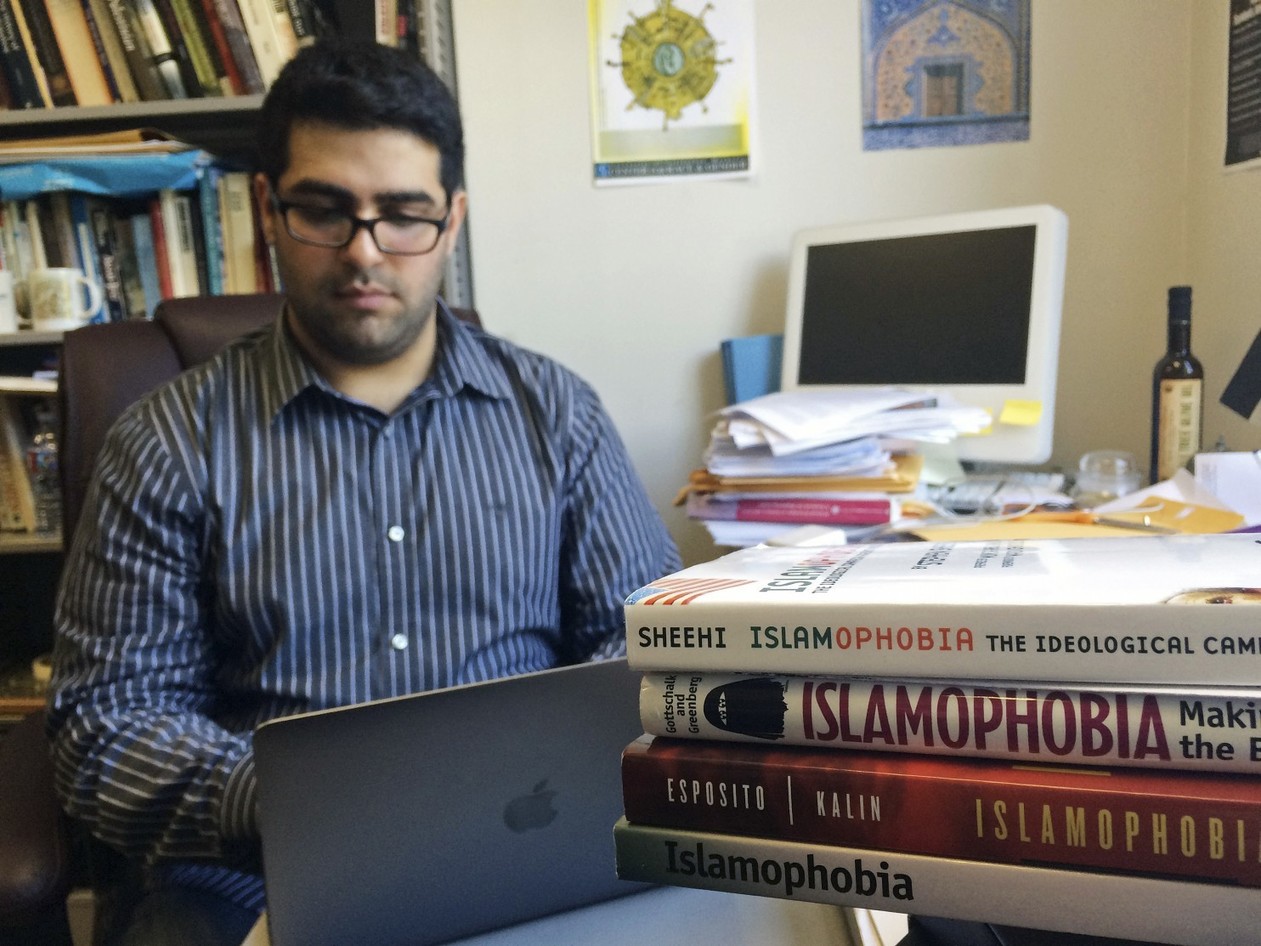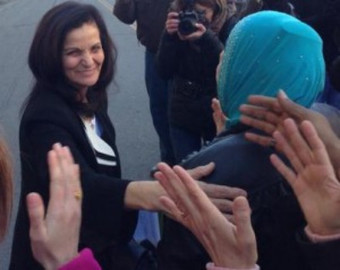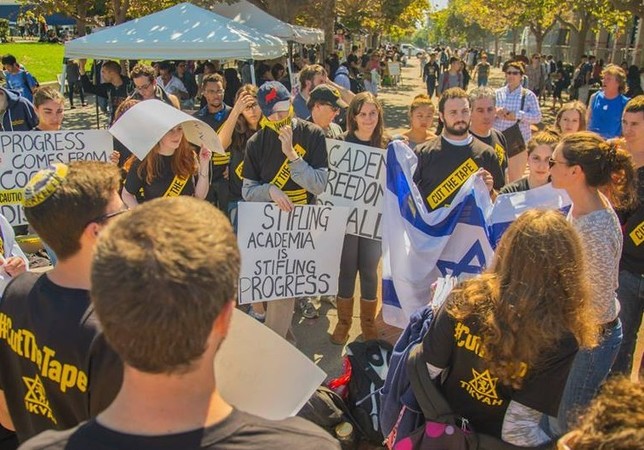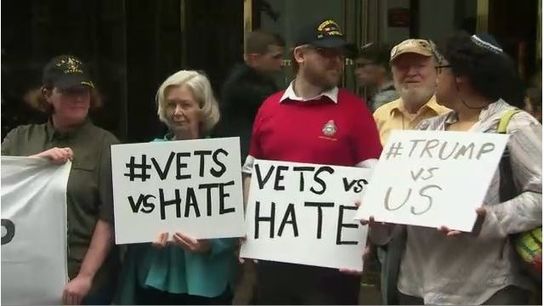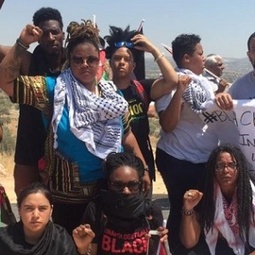by Noura Erakat, Ingrid Jaradat Gassner, Diana Buttu, Nur Arafeh
Al-Shabaka
Israel has been cracking down on human rights defenders. Top Israeli officials have targeted activists in the Boycott, Divestment and Sanctions (BDS) movement, calling for “targeted civil eliminations” of BDS leaders and declaring that they should “pay the price” for their work. BDS co-founder Omar Barghouti has been cited by name.
Within Israel, the High Court in 2015 upheld a 2011 law that penalizes organizations and persons who call for the boycott of Israel or its illegal settlements and allows suits against them. Israel has also been investing considerable resources in fighting the BDS movement abroad.
How far will Israel go in carrying out its threats against human rights defenders? What should Palestinians and the international solidarity movement do in order to protect themselves and to safeguard the progress of the movement? In this roundtable, Al-Shabaka Policy Advisors Noura Erakat, Ingrid Jaradat, and Diana Buttu examine specific threats to the BDS movement and other human rights defenders in the Occupied Palestinian Territory (OPT), Israel, and beyond. Al-Shabaka Policy Fellow Nur Arafeh served as the roundtable’s facilitator.
Noura Erakat provides an historical and legal overview of the “targeted killings,” or extrajudicial assassinations, that have killed hundreds of Palestinians over the years, particularly recently in the West Bank due to an uptick in Palestinian armed resistance. Ingrid Jaradat outlines trends and specific Israeli attacks on BDS activists and other human rights defenders as well as Western country complicity in these attacks. 1 Diana Buttu provides more evidence of Israeli attacks and argues that they are currently increasing in frequency and hysteria.
Noura Erakat: Israel’s Extrajudicial Assassinations
Israel has used extrajudicial assassinations – the taking of someone’s life without a trial to determine guilt – for decades. 2 The government first took public responsibility for these assassinations during the Al-Aqsa Intifada, specifically in November 2000, when it termed them “targeted killings” and created a legal justification for their use against Palestinians. 3
Israel argued that it is engaged in an “armed conflict short of war” with Palestinians in order to define the conflict as one against “terrorists.” This move has permitted Israel to use military force, defined by law, without affording Palestinians the status of combatants or soldiers. Instead, Palestinian use of force is regarded as terroristic regardless of whether it targets civilians or military installations; in effect, all Palestinian use of force is considered illegitimate and illegal.
Israel thus created a legal framework whereby Palestinians do not have the right to use force but Israelis have the right to kill them even when they are posing no threat and without due process. This framework aims to incapacitate any kind of resistance from Palestinians and expand Israel’s right to use force. It is within this context that Israel also changed the terminology of the violence: “assassination” became “targeted killing.”
This practice is illegal, as the arbitrary taking of a life denies the suspect the right to a fair trial as guaranteed by Article 14 of the International Covenant on Civil and Political Rights. International law also restricts the use of intentional lethal force “during law enforcement operations to situations necessary to protect life” – that is, police can only shoot to kill when it is clear that the suspect is going to kill someone and there is no other means to detain them. In regard to an occupation, the law is even clearer. Because an occupying power is no longer at war, its force is limited to law enforcement authority. This means that the occupying power cannot use lethal force as a measure of first resort.
“Israel [has] created a legal framework whereby Palestinians do not have the right to use force but Israelis have the right to kill them even when they are posing no threat and without due process.”
In 2000, in line with international law, the international community, including the George W. Bush administration, opposed Israel’s use of excessive force and insisted that it should only use law enforcement power vis-à-vis Palestinians. However, after the United States’ adoption of the same policy of “targeted killing” in the aftermath of September 11, its condemnation of the practice diminished. Israel and the United States have since been working together on global counterterrorism programs that elide the distinctions between the United States’ war against non-state actors and Israel’s ongoing settler-colonial ambitions toward Palestine.
For example, when the UN Security Council authorized the use of force against Al-Qaeda in Afghanistan in 2001, Israel attempted to apply the same logic to its use of force against Palestinians. The International Court of Justice rejected this in its 2004 Advisory Opinion because Israel, as the occupying power, has sole jurisdiction in the territories from which these threats emerge, in contrast to the United States, which did not already exercise jurisdiction over Afghanistan. Israel therefore cannot claim to use self-defense against a population over which it already has military and law enforcement authority.
Global protests against Israel’s use of assassinations led to an almost complete halt of its practice in the West Bank, until recently. However, Israel continued to use extrajudicial assassinations in the Gaza Strip, where it claims it no longer has authority since its unilateral disengagement in 2005. At the same time, Israel does not claim that the Gaza Strip has gained independence or status as a state. It continues to describe Gaza as a “hostile entity” – a concept that has no grounding in international law. The significance of that status is that while a state has the right to build an army and use force, a “hostile entity” does not. Israel has therefore claimed since 2005 that the Gaza Strip is neither occupied nor independent but has the unprecedented status of a hostile entity, against which force can be used but whose population does not have the right to self-defense.
Thus, Israel has further expanded its right to use military and lethal force while further diminishing the Palestinian right to resistance, despite the fact that international law legitimates the use of force by people under foreign colonization. 4 Israel used this argument in killing Sheikh Ahmed Yassin and Dr. Abdel Aziz Rantisi in Gaza and hundreds of Palestinians between 2000 and 2005.
Today, Israel uses lethal force in the West Bank, including East Jerusalem, as well as the Gaza Strip with little to no global protest. Its shoot-to-kill policy toward Palestinians accused of wielding knives is a prime example of extrajudicial assassination: Society is expected to take the Israeli government’s word that the Palestinians who were killed had a knife and were threatening to use it against a soldier who reasonably feared for his life. The entire process of inquiry has been removed and Israel behaves as judge, jury, and executioner, rendering Palestinian life even more precarious.
Ingrid Jaradat: Israel’s Local and Global Campaigns Against BDS
Israel has always oppressed human rights defenders, not only in the OPT but in historic Palestine and beyond, as part of its effort to suppress activity for justice and freedom of Palestinians, including nonviolent resistance and advocacy. This oppression has included armed violence, arbitrary restrictions on freedom of movement, travel bans, forcible (temporary) removals, arrest, imprisonment, and torture.
At least three tactics are intended to stifle human rights activism under Israel’s increasingly right-wing government.
First is the increase in violent threats and attacks, especially in the OPT. They are caused mainly by aggressive Israeli colonization, incitement by Israeli officials against Palestinians who are resisting and indeed anyone criticizing Israeli policy, and impunity granted for assaults on Palestinian property and persons. These give soldiers, settlers, and others license to issue death threats and beat and kill Palestinians, particularly human rights defenders.
Second is Israel’s launch of an overt attack on freedom of expression and related civil and political rights in the OPT as well as inside Israel. This has been done explicitly because of activists’ advocacy for international accountability measures for the state and those responsible or complicit in its unlawful and oppressive policies. This is a new development, as historically Israeli governments led by the Zionist center/left have avoided such visible attacks on civil liberties that undermine the claim of Israel being “the only democracy in the Middle East.” Instead, previous governments had used pretexts related to “security” and “counterterrorism,” which are available under Israel’s emergency regulations and the unaccountable military regime in the OPT, to silence such Palestinian resistance as peaceful protests and human rights advocacy.
More recently, Israeli governments are claiming that freedom of expression, when exercised to promote Palestinian human rights – particularly calling for or carrying out boycotts – is an offense against “security” that must be suppressed. In addition to publically endorsing violence against human rights defenders, Israeli officials and lawmakers are adopting more restrictive and intimidating legislation. Israeli authorities have also stepped up intelligence surveillance and cyber attacks on human rights defenders, while delivering punishment through administrative measures, such as travel bans and revocation of Israeli residency permits for “lack of center of life in Israel” or, more recently, “breach of loyalty to the State of Israel.”
Third is the extension of these Israeli attacks to other countries and the complicity of some Western countries in them. In seeking to thwart BDS not only at home but also abroad, Israel is leading a McCarthy-style campaign against anyone taking a stand for the Palestinian people. This is occurring particularly in Europe and North America, where it is undermining citizens’ civil liberties and civil society space.
False allegations of anti-Semitism are at the heart of these attacks. Israel and its lobbies have invested substantial resources to distort the meaning of racial discrimination as adopted in international conventions. So-called working definitions of anti-Semitism promoted by Israel and Israel-sponsored lobbies declare any opposition to Zionism and Israeli policies to be a form of racial discrimination against the “Jewish people” and thus anti-Semitic.
According to a recent BDS National Committee report, these attacks, which are occurring from Austria to the United States, include:
- Media campaigns led by Israeli foundations, lobby groups, and affiliated journalists and newspapers targeting BDS activists;
- Lawsuits sponsored by Israel and affiliated groups against BDS activists, unions, and local councils;
- Pressure on banks, often involving “investigative” Israeli journalists and threats of financial damage, resulting in the closure of bank accounts of groups and organizations defending Palestinian human rights;
- Pressure on owners of public events facilities, including municipalities and NGOs, to deny venues to BDS human rights defenders;
- Anti-BDS motions brought to parliaments by Israel lobby groups and supportive MPs;
- Spying and sabotage against BDS activities by pro-Israel groups pretending to be Palestinian human rights activists.
Authorities in the countries in which these attacks are taking place have largely failed to protect their citizens who are targeted. Even more worrisome, in some Western countries governments and other authorities have responded to Israeli lobbying by adopting their own measures to suppress BDS campaigning.
In France, for example, some 30 BDS activists have faced criminal charges, and several have been convicted by French courts that falsely interpreted the call for a boycott of Israeli products as discriminatory against a “nation,” which is a criminal offense under French law. Moreover, French authorities apply such court rulings to all forms of BDS activism, even when they do not involve calling for a boycott of Israeli products. French police have repeatedly suppressed pro-BDS demonstrations.
In the UK, senior members of the conservative government have repeatedly put forth allegations that the BDS movement is anti-Semitic. The government has also permitted the channeling of funds for anti-BDS initiatives through public institutions. Further, the UK College of Policing adopted an Israel-promoted “EU working definition of anti-Semitism,” even though the EU clarified that it had not issued the document containing the definition.
In addition, the UK government issued a policy note on public procurement in February 2016 that restates the existing British law and WTO rules that public bodies are not permitted to exclude a company from tenders and contracts due to its “country of origin.” The government also announced a consultation in November 2015 concerning local government pension funds. It states that local governments’ investment decisions “should not pursue policies which run contrary to UK foreign policy” and includes a proposal that would give the national government veto power over investment decisions of local councils.
Canada recently signed a cooperation agreement with Israel that includes an explicit commitment to help Israel repress the BDS movement. The Canadian government – both the conservative opposition and the ruling liberals – then adopted a motion to condemn all BDS actions by Canadian citizens. Canadian politicians also frequently denounce campus BDS activism as anti-Semitic.
“In seeking to thwart BDS not only at home but also abroad, Israel is leading a McCarthy-style campaign against anyone taking a stand for the Palestinian people.”
In the United States, anti-BDS bills and laws have been introduced in more than 20 states and in Congress. All seek to withhold public funds, contracts, and/or investments from entities that endorse BDS. Most recently, New York Governor Andrew Cuomo adopted one of these bills per decree, bypassing the lawmaking process in which the bill had been challenged and establishing a precedent for other governors.
These attacks have had a negative impact on the ability of civil society to carry out BDS activities, and have been especially challenging in Europe. The diversity of national law, politics, and culture makes it hard to provide Europe-wide support to BDS campaigners. Until today, BDS activists in many European countries lack effective legal support. Nevertheless, the effort of the BDS National Committee (BNC) and many European partners in jointly defending the right to and legitimacy of BDS has helped overcome initial frustration. Moreover, human rights defenders in Europe have proven that they possess both the resilience and creativity required to carry out proactive BDS activism despite Israeli attacks and complicit national authorities.
In the United States, leading civil rights associations, including the American Civil Liberties Union (ACLU), the Center for Constitutional Rights, and the National Lawyers Guild, coordinate with each other and with the organization Palestine Legal to protect the civil and constitutional rights of Americans who speak out for Palestinian freedom. All the associations have clarified that the right to boycott for social and political change is protected under the Constitution, and that infringements against this right will not stand up to legal challenge.
Diana Buttu: Israeli Threats to Activists in an Increasingly Fascist State
The Israeli government has been threatening human rights defenders in Israel, both Palestinian citizens as well as Israeli Jews, directly and through proxies. Late last year, Israeli authorities attacked the funding of Baladna (the Association for Arab Youth), which was protesting the recruitment of Palestinian youth in the Israeli Army. In March 2016, former Defense Minister Moshe Ya’alon described Breaking the Silence – an organization of Israeli soldiers who expose Israeli actions in the OPT – as comprised of “traitors.” In addition, death threats have been made against a B’Tselem volunteer who filmed the extrajudicial assassination of a Palestinian in Hebron in March 2016.
In July 2016, Israel passed a law requiring NGOs that receive more than half their funding from foreign governments to declare in all publications their sources of foreign funding. The law does not require disclosure of funds by private donors. The law affects human rights NGOs, as they often receive funds from foreign governments, while right-wing NGOs tend to obtain resources from ideologically-motivated private donors.
Further, by using NGOs that are largely sponsored by the Israeli government, Israel has targeted the work of these human rights organizations by pressing for foreign funding cuts. The Israeli-sponsored organizations only challenge NGOs that are critical of Israel’s actions; they do not question the funding of human rights organizations that are critical of the Palestinian Authority.
Such attacks have been a mainstay of Israel’s colonial rule since as early as 1948. However, the difference now is that these attacks are increasing in frequency and hysteria, creating an atmosphere of “us” versus “them” wherein anyone who is not “us” (that is, right-wing Zionist Jewish-Israeli) is a legitimate target for attack. Hence, B’Tselem and Breaking the Silence – neither of which is an anti-Zionist organization – now fall within the “them” category. Essentially, any criticism of Israel, even as mild as Israeli human rights organizations often mete out, is seen as a “threat” to Israel. A rise in fascism naturally follows, when, for example, Israeli politicians, including current Justice Minister Ayelet Shaked, labels Palestinian children “little snakes.” These and other pronouncements by Israeli leaders reflect the rise in support for fascist policies in Israeli society, and they also fuel that fascism.
“[The Israeli government’s attacks against human rights defenders in Israel] are increasing in frequency and hysteria, creating an atmosphere of ‘us’ versus ‘them’ wherein anyone who is not ‘us’ (that is, right-wing Zionist Jewish-Israeli) is a legitimate target for attack.”
Avigdor Lieberman’s recent appointment as defense minister and Yehuda Glick’s entry into the Knesset are reflections of this rising fascism. Lieberman supports Israeli war crimes, whether the bombing and blockade of the Gaza Strip or the accelerated expansion of settlements. He advocates ethnic cleansing of Palestinians in Israel (euphemistically termed “transfer”) and has said that Palestinians who do not declare loyalty should “have their heads chopped off with an axe.” He has also called for Palestinian prisoners to be drowned. Lieberman is running on a platform that includes instituting the death penalty for Palestinians who resist Israel’s rule – those who Israel conveniently deems to be “terrorists.”
Despite being a settler and openly advocating these policies, Lieberman was welcomed in foreign capitals when he was foreign minister. Now, as the minister in charge of Israel’s wars, he will have the opportunity to put his beliefs into practice. Lieberman’s latest ascendance is obviously alarming, yet what is more alarming is that it appears to be business as usual for the international community, with the United States already declaring that his new role in the government will not affect an unprecedented U.S. military assistance package for Israel: likely $4 billion per year for 10 years.
What Must be Done?
This concluding section draws on ideas put forward by roundtable participants Noura Erakat, Ingrid Jaradat, and Diana Buttu.
In the case of Omar Barghouti who, in addition to being threatened was recently denied the right to travel outside the country amidst reports that his residency may be revoked, some limited protection may have been achieved as a result of his adoption as a human rights defender by Amnesty International, Human Rights Watch, the International Federation for Human Rights, and Euromed Rights, as well as the wide media publicity of the attack on him. However, more effective protection for Barghouti requires public condemnations of the Israeli attack and interventions on his behalf by senior representatives of Western governments, the EU, and the UN. All have been called on to do so. Follow-up advocacy in the OPT, Israel, and abroad is needed to ensure that they will take the necessary steps.
Meanwhile, even more aggressive colonization of the OPT, including East Jerusalem, and more repressive measures against human rights defenders may broaden international support for those who advocate for the Palestinian people. This would accelerate the process of isolation of Israel’s regime of settler colonialism, apartheid, and occupation. However, sustained and proactive BDS campaigning and action supporting the defense of civil and political rights, including the right to BDS, will be required from human rights defenders. This is particularly true at present, with powerful Western governments launching yet another Oslo-type “peace initiative” to protect Israel’s regime and the oppressive status quo. To that end, the wider pro-justice movement can lobby, invite Palestinian human rights defenders targeted by Israel to speak in their country, and join local or regional efforts for effective legal support of BDS campaigners.
On the Palestinian side, activists should draft diplomatic initiatives asking EU governments to condemn extrajudicial assassinations and hold Israel accountable for its crimes. Palestinians also need a media strategy and a legal team to pursue cases against Israeli soldiers. Although several human rights organizations and activists are working on this, their efforts are usually uncoordinated and sporadic; there is a need to achieve cohesion through collaboration. In addition, human rights NGOs should work together to address the restrictions on their funding, whether due to the new Israeli law mandating disclosure of foreign funds or the coordinated attacks on their funding by Israel and Israeli-backed NGOs.
Source: al-shabaka.org




